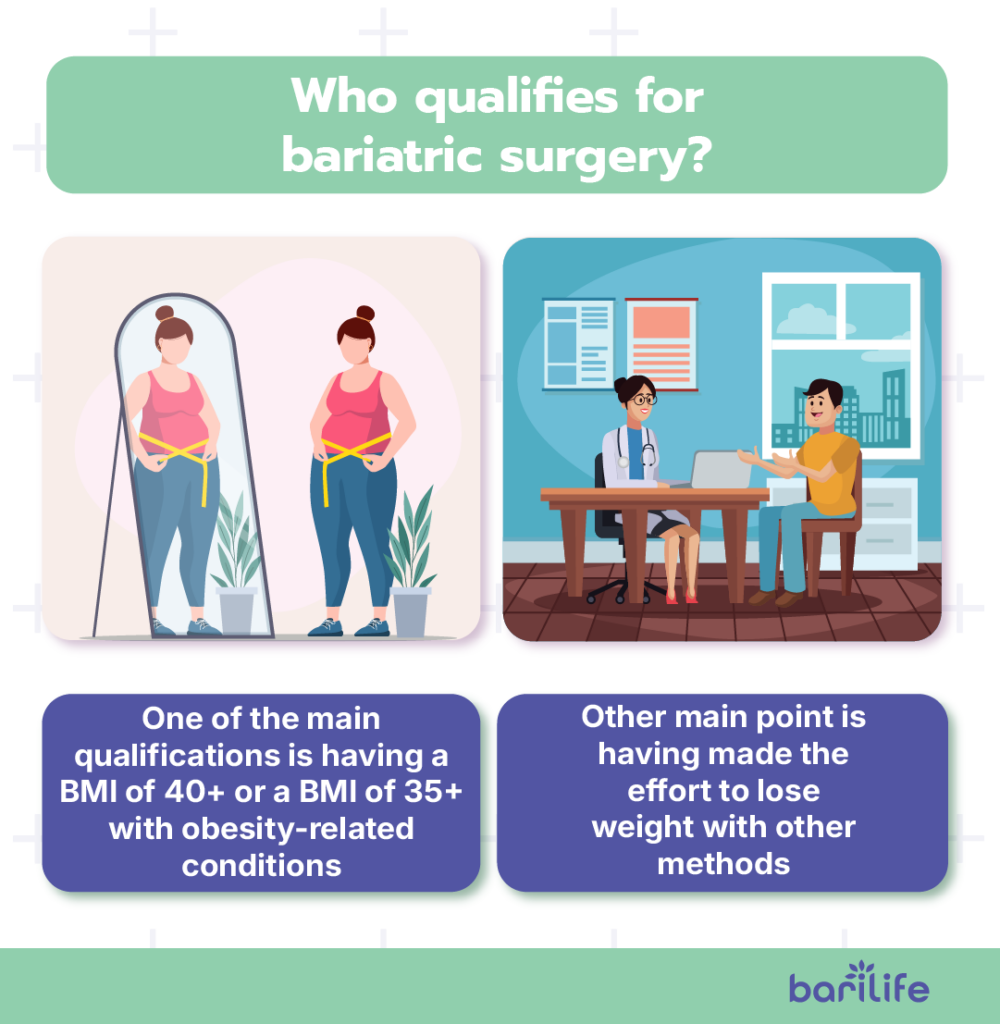Bariatric surgery is a medical procedure that shrinks the stomach or changes how the intestines absorb nutrients. It’s a tool to help you lose weight and improve overall health and well-being.
Among the benefits of bariatric surgery are improved health outcomes, enhanced quality of life, and significant weight loss. It is also essential for managing post-surgery nutrition, where bariatric multivitamins and bariatric vitamins play a key role in maintaining health.
To have bariatric surgery, you’ll need to meet several qualifications. For example, if you are struggling with obesity or health conditions related to excess weight, such as diabetes or high blood pressure, bariatric surgery may be the key to helping you reclaim your health.
Because we know the amount of information about bariatric surgery can be daunting, we’ve created this essential guide to help you explore the procedure, its qualifications, the types of methods available, and other necessary information.
What is Bariatric Surgery and How Does it Work?

There are several types of bariatric surgeries. Each procedure is designed to alter your digestive system to help with weight loss.
These surgeries are typically recommended if you have severe obesity and have struggled to lose weight through traditional methods such as lifestyle modifications or medications.
They also require supplements like liquid bariatric vitamin or bariatric vitamins chewable to ensure proper nutrient absorption.
How long does bariatric surgery take? The duration depends on the type of procedure. For example, gastric bypass surgery typically takes about 2-4 hours.
There are two main mechanisms for altering the digestive system: restrictive methods and malabsorptive methods.
Restrictive surgeries reduce the size of the stomach and limit how much food it can hold. These procedures help you feel full faster and limit your food intake.
Malabsorptive surgeries reroute or shorten parts of your digestive system and reduce how much calories and nutrients it absorbs. By reducing absorption, you can also achieve weight loss.
Some procedures, like gastric bypass, combine both approaches.
Who Qualifies for Bariatric Surgery?
Bariatric surgery is not suitable for everyone. Only those who meet specific criteria are candidates for these procedures.
One of the main qualifications is a body mass index (BMI) of 40 or greater. If your BMI is 35 or higher, you may also qualify if you have obesity-related health conditions such as type 2 diabetes, sleep apnea, or high blood pressure.
To manage post-surgery nutrition and avoid deficiencies, taking bariatric multivitamin with iron is often required.
You must also prove that you’ve made a serious effort to lose weight through diet, exercise, or medication but have been unsuccessful in achieving or sustaining significant results.
Bariatric surgeons also assess if you are psychologically ready for the surgery and willing to make the necessary lifelong changes.
The main modifications include altering your diet, exercising regularly, and keeping up with ongoing medical follow-ups.
While bariatric surgery is generally recommended for individuals between the ages of 18 and 65, exceptions may be made on a case-by-case basis for those outside this range.
Your insurance plan can also play a role in determining your eligibility. Many insurers require that your doctor document the medical necessity of the surgery. They may also require that you meet certain pre-surgical guidelines, such as completing nutritional counseling or other steps.

What are the most common types of bariatric surgery?
As we mentioned earlier, there are several types of bariatric surgeries. Knowing their differences may help you and your medical provider decide which option is best for you.
Gastric Bypass (Roux-en-Y)
During gastric bypass, the surgeon creates a small pouch at the top of the stomach by stapling part of the stomach closed. Making your stomach smaller helps you feel full faster.
The surgeon also reroutes a portion of the small intestines into this pouch, reducing the amount of calories and nutrients the body absorbs.
This procedure is one of the most effective bariatric procedures for sustained weight loss, but it requires sticking to strict dietary guidelines and avoiding complications like dumping syndrome.
Sleeve Gastrectomy
In a sleeve gastrectomy, the surgeon removes around 80% of the stomach, leaving a narrow, tube-shaped stomach. This significantly limits how much you can eat and reduces your hunger hormones.
It’s a rather simple procedure compared to the gastric bypass and typically has fewer complications.
Adjustable Gastric Banding
Adjustable gastric banding involves the surgeon placing a silicone band around the upper part of the stomach to create a small pouch. Over time, the band can be tightened or loosened to control how much food is eaten.
While this procedure is less invasive, its popularity has declined due to mixed long-term outcomes and the need for frequent adjustments.
Biliopancreatic Diversion with Duodenal Switch (BPD/DS)
This procedure is a bit more complicated. It combines a sleeve gastrectomy with a significant rerouting of the small intestine.
It can be highly effective for severe obesity, but there is a higher risk for complications and nutritional deficiencies.
Endoscopic Procedures
Endoscopic procedures, such as gastric balloons and endoscopic sleeve gastroplasty, are non-surgical options for weight loss.

These procedures are less invasive and don’t require surgical incisions. However, they are typically temporary solutions. They are often recommended for people who don’t qualify for traditional bariatric surgery or who prefer a less permanent approach to weight management.
Each procedure has risks and benefits. It’s important to work with your medical provider to determine which is best for your health and lifestyle goals.
How does bariatric surgery promote weight loss?
Bariatric surgery promotes weight loss by restricting how much food you need to eat to feel full and by decreasing how much nutrients and calories your body absorbs.
Some procedures also change your hormones, like ghrelin, known as the hunger hormone, and GLP-1, which helps regulate appetite and insulin sensitivity. These changes to your hormones suppress hunger, help you feel full, and improve your blood sugar control.
What are the benefits of bariatric surgery?
Bariatric surgery offers numerous health benefits that extend beyond weight loss.
- Significant weight loss: Most people achieve substantial weight loss and reach a healthier body weight.
- Improved health outcomes: Many people experience remission of obesity-related conditions such as type 2 diabetes, high blood pressure, and sleep apnea. Weight loss also lowers the risk of cardiovascular disease, stroke, and certain types of cancer.
- Enhanced quality of life: Most people have increased mobility and reduced joint pain, making daily activities easier. Often, there is also an improvement in mental health as well with reduced symptoms of depression and anxiety and increased self-esteem and confidence.
- Longevity: People with severe obesity may enjoy a longer life expectancy with a reduced risk of premature death from obesity-related complications.
- Improved fertility and pregnancy outcomes: Individuals of childbearing age may experience enhanced fertility and reduced risks during pregnancy.
- Better sleep quality: Many people sleep better after bariatric surgery due to improvements in sleep apnea and other sleep disorders related to obesity.
- Enhanced cardiovascular health: Bariatric surgery typically helps lower cholesterol levels and improves heart function.

What are the potential risks of bariatric surgery?
While bariatric surgery has many benefits, there are also some risks to consider.
- Surgical risks: Having surgery puts you at risk for bleeding, infection, blood clots, or adverse reactions to anesthesia. There is also the risk of potential leaks in the digestive tract.
- Nutritional deficiencies: Some common nutritional deficiencies include low levels of iron, calcium, vitamin B12, and other essential nutrients.
- Dumping syndrome: Dumping syndrome is a common side effect of bariatric surgery that is characterized by nausea, diarrhea, and dizziness caused by rapid gastric emptying.
- Long-term complications: Bariatric surgery can put you at a higher risk of developing gallstones, bowel obstructions, stomach ulcers, or acid reflux.
- Failure to lose weight or regain weight: Even with the adjustments to the digestive system, some people still struggle to meet their weight goals, or they regain some weight. Maintaining a healthy weight requires daily and lifestyle changes.
What lifestyle changes are needed after bariatric surgery?
Bariatric surgery is one tool on the journey to achieving and maintaining a healthier weight. However, you’ll need to make lifestyle changes as well.
- Dietary changes: Right after surgery, you’ll start with a liquid diet and gradually transition to eating small, nutrient-dense meals. It’s important to avoid foods high in sugar and fat as they can cause dumping syndrome and interfere with weight loss.
- Exercise: Incorporating regular physical activity is essential for achieving your weight loss goals and maintaining a healthy weight. Start with low-impact exercises such as walking or swimming and gradually increase your intensity.
- Nutritional supplements: You’ll need to take daily vitamins and minerals to prevent nutritional deficiencies. Your health provider may also ask that you do regular blood work to monitor your nutrient levels and adjust your supplements as necessary.

- Behavioral changes: Meet with a counselor or registered dietitian to learn how to have a healthy relationship with food. Practice mindful eating by only eating when truly hungry, chewing food thoroughly, eating slowly, and stopping when you feel full.
Conclusion
Bariatric surgery can be a powerful tool for achieving significant and lasting weight loss for people with obesity.
By altering the digestive system, these procedures help reduce food intake, influence hunger hormones, and improve nutrient absorption.
However, individual success depends on meeting specific eligibility criteria, understanding the potential risks, and committing to lifelong lifestyle changes.
How Bari Life Can Help
Maximize the benefits of your bariatric surgery with Bari Life’s specialized supplements.
Designed to meet the unique nutritional needs of bariatric patients, our vitamins and supplements help support weight loss, maintain energy levels, and prevent deficiencies.
Stay healthy, feel your best, and make the most of your surgery—start with Bari Life today!
If you want to learn more, why not check out these articles below:
- Success Rate of Bariatric Surgery
- Can You Have Bariatric Surgery Twice?
- Long Term Effects of Bariatric Surgery
- Is Bariatric Surgery Outpatient?
- When Was the First Bariatric Surgery Performed?

Leave a Comment
Your email address will not be published.